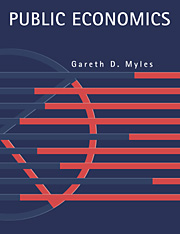Book contents
5 - Income taxation
Published online by Cambridge University Press: 05 June 2012
Summary
INTRODUCTION
The taxation of income is a major source of revenue in most developed countries. It is also one of the most contentious. From one point of view, an income tax is seen as a direct means of effecting redistribution in order to meet objectives of equity. From another, the imposition of an income tax is viewed as a major disincentive to effort and enterprise particularly when the marginal rate of tax increases with income. The theory of income taxation shows how these competing views influence the design of the optimal tax and how the competing trade-offs are resolved.
The analysis of income taxation that is undertaken below follows from the initial contribution of Mirrlees (1971). Prior to that, there had been no formal analysis of the structure or determinants of an income tax schedule that fully captured the efficiency/equity trade-off involved in income taxation. In addition, the Mirrlees analysis also embodied the fact that the truly relevant characteristics for taxation, the unobservable ability levels of the households, can only be inferred indirectly from observed behaviour. This implies that the structure of the income tax must be compatible with the revelation of this information by households.
The chapter begins by providing a general description of the Mirrlees' economy which is the basis for the analysis. The major theoretical results that have been derived both for the general case and for the restricted constant marginal tax rate case are described. This is followed by a review of the results of a number of numerical studies.
- Type
- Chapter
- Information
- Public Economics , pp. 131 - 166Publisher: Cambridge University PressPrint publication year: 1995



